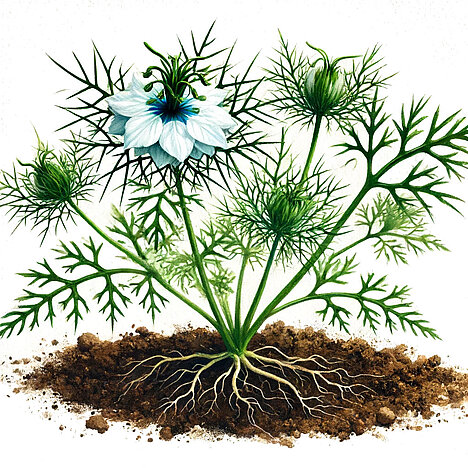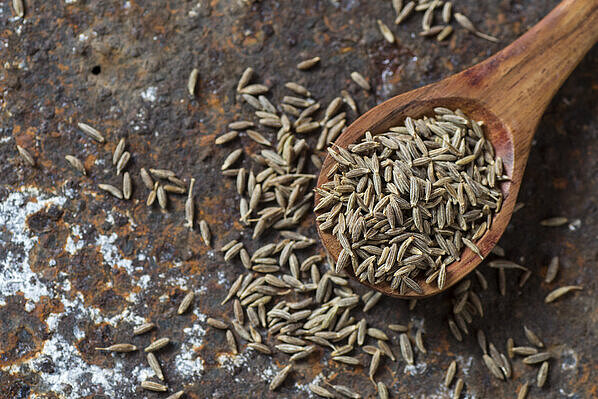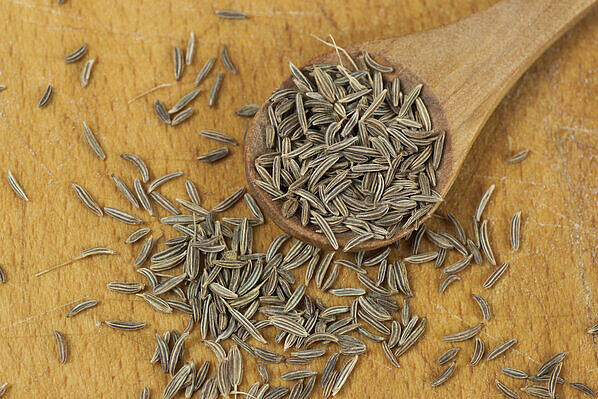Egyptian black cumin

What is Egyptian black cumin?
Egyptian black cumin (Nigella sativa) is an annual plant with fine blue or white flowers and capsule-like fruits containing the seeds. The seeds have a spicy taste and a nutty aroma and are often used as a spice or oil in cooking. Egyptian black cumin should not be confused with true caraway (Cuminum cyminum) or cumin (Carum carvi), which belong to a different plant family.
Egyptian black cumin contains many valuable ingredients, such as essential oils, fatty acids, vitamins, minerals and antioxidants. These substances have various positive effects on the body, such as
- Anti-inflammatory: Egyptian black cumin can reduce inflammation in the body, which can lead to pain, swelling or redness. This can help with arthritis, allergies or skin problems, for example.
- Immune boosting: Egyptian black cumin can strengthen the immune system and increase the body's resistance to pathogens. This can help with infections, colds or parasites, for example.
- Antimicrobial: Egyptian black cumin can inhibit or kill the growth of bacteria, fungi or viruses. This can help with wounds, gastrointestinal complaints or gum inflammation, for example.
- Antioxidant: Egyptian black cumin can neutralize free radicals that can cause cell damage. This can help with ageing processes, cancer or diabetes, for example.
How can Egyptian black cumin help dogs?
Egyptian black cumin can also have many health benefits for dogs. For example, it can:
- Make the coat shiny and the skin healthy: Egyptian black seed contains omega-3 and omega-6 fatty acids, which are important for good skin and coat health. It can also soothe skin irritations and promote hair growth.
- Improve digestion: Egyptian black cumin can support intestinal flora and prevent or treat flatulence, diarrhea or constipation. It can also stimulate the appetite and improve nutrient absorption.
- Clear the airways: Egyptian black cumin has an expectorant and bronchodilator effect that can help with coughs, colds or asthma. It can also soothe mucous membranes and relieve inflammation.
- Protect the joints: Egyptian black cumin can increase joint lubrication and slow down cartilage degradation. It can also reduce pain and stiffness caused by osteoarthritis or other joint diseases.
- Strengthen the cardiovascular system : Egyptian black cumin can lower blood pressure and promote blood circulation.
Disadvantages
- Allergic reactions: One of the most common disadvantages of Egyptian black seed for dogs is the risk of an allergic reaction. The seeds can trigger skin rashes, itching, swelling or breathing difficulties in sensitive dogs. If you want to give your dog Egyptian black cumin, you should therefore always do an allergy test first. Give him a small amount and observe him for possible symptoms.
- Interactions with medication: Another disadvantage of Egyptian black cumin for dogs is the possible interaction with medications. The seeds can strengthen or weaken the effect of certain medications. This can lead to undesirable side effects or reduced effectiveness. You should be particularly careful if your dog is taking medication for diabetes, high blood pressure, blood clotting or epilepsy. Always consult your vet before giving Egyptian black cumin to your dog if they have a chronic condition or take medication regularly.
- Overdose: A final disadvantage of Egyptian black seed for dogs is the risk of overdose. The seeds are very potent and can lead to symptoms of poisoning if the dosage is too high. Symptoms of overdose include vomiting, diarrhea, lethargy, tremors or convulsions. To avoid an overdose, you should always stick to the recommended dosage and not give your dog more than one teaspoon per day. In addition, you should not give your dog Egyptian black cumin permanently, but only as a cure or for acute complaints.
Egyptian black cumin can have some benefits for dogs, but also some disadvantages.
Properties 5
Are you looking for other ingredients with a specific property?
Just click on them to find more.
If you notice any signs of hypersensitivity or poisoning in your dog, you should see your vet immediately. We are not a substitute for a vet, but we try to be as accurate as possible. Every dog reacts differently and we recommend you get a second opinion or consult your vet if in doubt.
Stay healthy and take good care of your four-legged friend!😊
Similar to Egyptian black cumin
Cumin is an annual plant that grows up to 50 cm high. It has finely pinnate leaves and small white or pink flowers that are arranged in umbels. The fruits are elongated seeds with fine bristles that...
Caraway (Carum carvi) is a plant from the umbellifer family, which also includes fennel, aniseed, coriander and carrots. Caraway grows on roadsides and meadows and has white to pink flowers that...
True black cumin (Nigella sativa) is an annual plant with fine, feathery leaves and blue-white flowers. The flowers develop into small, spherical fruits that contain many black seeds. These seeds...
Black cumin oil is a vegetable oil that is produced by cold pressing the seeds of the black cumin plant. This plant belongs to the buttercup family and grows in West Asia, India, North Africa and...



